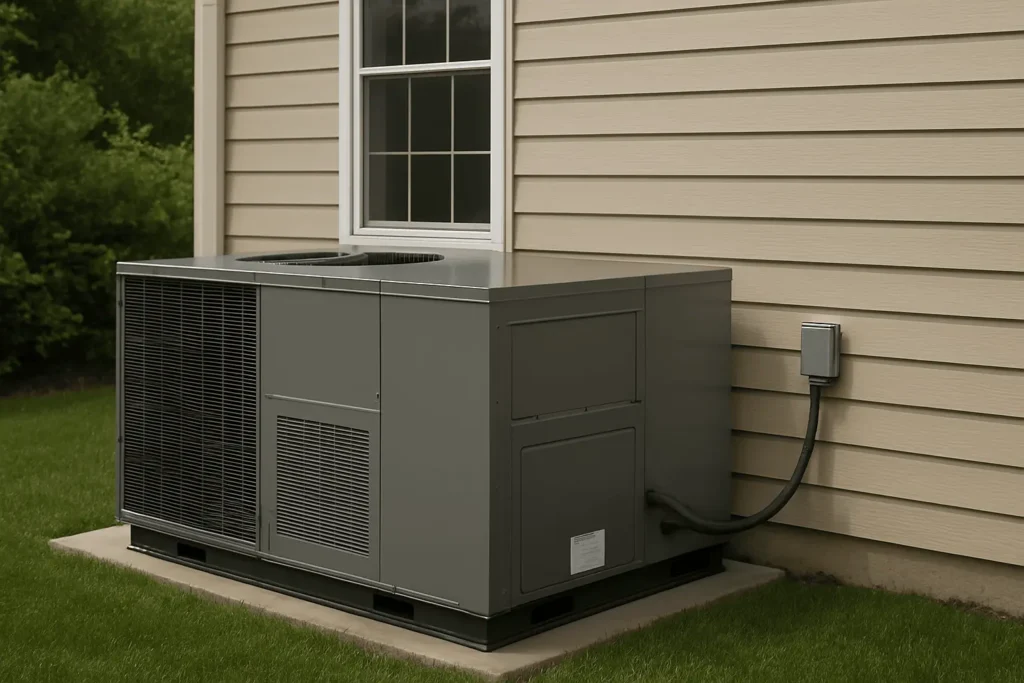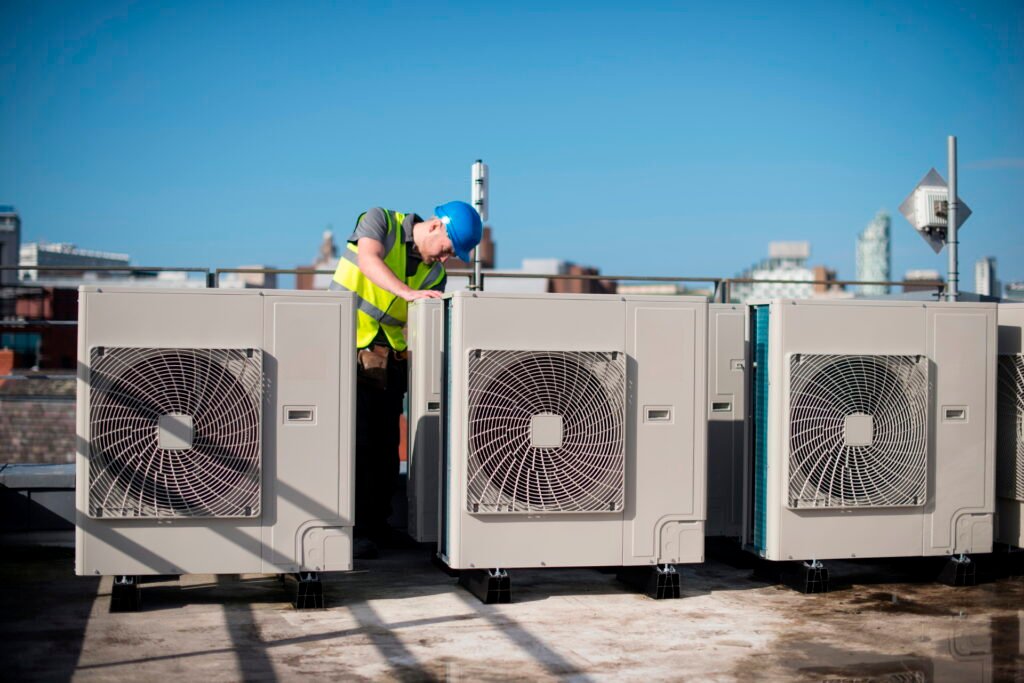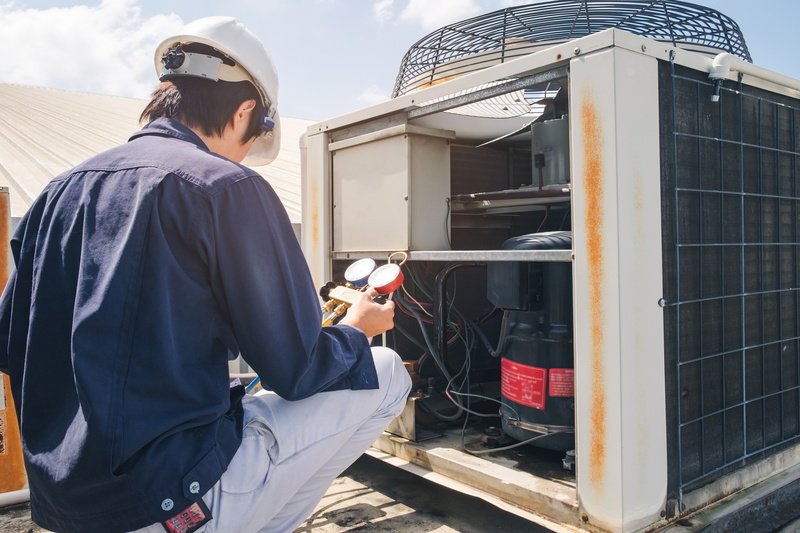When it comes to ensuring year-round comfort in your home or business, having an efficient and reliable HVAC system is crucial. Among the many types of HVAC systems available, HVAC package units stand out as one of the most popular and practical choices for both residential and commercial properties. These all-in-one systems combine heating, cooling, and air filtration into one compact unit, offering several advantages. However, with different types available, understanding their features, components, and benefits is key to choosing the right one for your space. In this guide, we will explore the various types of HVAC package units, their components, and help you make an informed decision about which type is right for you.

What is an HVAC Package Unit?
Before diving into the specifics of the different types, it’s essential to understand what exactly an HVAC package unit is. Only put, an HVAC package unit is a self-contained system that combines all the components essential for heating, cooling, and ventilation into a single unit. This setup is different from split systems, which separate the indoor air handler and the outdoor condenser. The HVAC package unit houses all components in one place, making it ideal for properties where space for separate units is limited or non-existent. These systems are commonly installed on rooftops or on the ground outside buildings, which frees up valuable indoor space and makes maintenance easier. HVAC package units come in various models, including those powered by electricity, natural gas, or a combination of both. Whether you’re building a new home, upgrading an existing system, or installing a system in a commercial building, HVAC package units provide an efficient, space-saving solution.
Types of Package Units
There are various types of package unit systems available in the market, each designed to meet specific needs based on the climate and particular demands of the property. Below are some of the common types of package units, along with their distinct advantages.
Gas-Powered HVAC Package Units
Gas-powered HVAC package units are widely used in regions with colder climates, where heating is a priority. These units use natural gas as the primary fuel for heating, while employing a compressor and condenser coil system for cooling during warmer months.
Advantages:
Efficient Heating: Gas-powered units are particularly well-suited for areas experiencing harsh winters. Natural gas is an excellent heat source, and these systems are designed to heat spaces quickly and efficiently, ensuring that your home or business stays warm even in the coldest conditions.
Cost-Effective: Natural gas tends to be more affordable than electricity in many regions, making these systems more cost-effective over time. By using natural gas as a primary energy source, you can benefit from lower operational costs compared to systems that rely solely on electricity.
Long-Term Reliability: Gas-powered HVAC systems are known for their durability and long-term reliability. Once installed, they require relatively low maintenance, and their robust design makes them a trusted choice for both residential and commercial properties.
Electric-Powered HVAC Package Units
Electric-powered HVAC package units are perfect for homes or regions with mild climates and no access to natural gas. These units use electricity to power both the heating and cooling components. Resistance coils generate heat, while compressors are used for cooling.
Advantages:
Ideal for Mild Climates: These electric units are best suited for regions with moderate temperatures, where the demand for heating is not as high as in colder climates. They deliver both heating and cooling capacities, making them a versatile option for temperate conditions.
Quiet Operation: One of the standout features of electric-powered systems is their quiet operation. Unlike gas-powered units that rely on combustion, electric models run quietly, offering a more peaceful indoor environment.
Easy Installation: Since electric-powered systems do not require natural gas lines, the installation process is generally quicker and less complicated. This can help reduce upfront installation costs, especially in areas where installing gas lines would be costly or impractical.
Heat Pump HVAC Package Units
Heat pump HVAC package units offer year-round heating and cooling. They work by transferring heat from the outside air into the building during the winter and by extracting heat from inside during the summer. These systems use electricity to power a compressor and a reversing valve to switch between heating and cooling modes.
Advantages:
Energy-Efficient: Heat pumps are highly energy-efficient systems because they don’t generate heat; instead, they move heat from one place to another. This means that heat pumps consume less energy, making them an economical option for homeowners and businesses looking to reduce their energy bills while maintaining comfort.
Eco-Friendly: Since heat pumps use electricity to transfer heat rather than generate it, they are considered a more environmentally friendly choice compared to traditional gas-powered heating systems. They emit fewer greenhouse gases and have a lower environmental footprint.
Year-Round Comfort: Heat pump systems provide both heating and cooling in a single, integrated unit. This makes them an excellent all-in-one solution for properties that need consistent temperature control year-round, offering comfort through all seasons without requiring separate units for each function.
Dual-Fuel HVAC Package Units
Dual-fuel HVAC package units combine both gas and electric systems, offering flexibility for areas with variable climates. These units automatically switch between natural gas and electricity based on temperature and weather conditions, ensuring that the system operates at its most efficient level regardless of external conditions.
Advantages:
- Flexible Energy Use: Dual-fuel systems allow you to take advantage of the most cost-effective energy source depending on the season. During colder months, the system may rely on natural gas for heating, and during milder months, it can switch to electricity. This flexibility helps minimize energy costs while still delivering optimal performance.
- Optimized Efficiency: The ability to switch between gas and electric heating ensures that energy costs are kept to a minimum. By using the best energy source for the time of year, dual-fuel systems help optimize efficiency, providing comfort while reducing waste.
- Adaptable: These systems are perfect for regions with unpredictable weather patterns, as they are capable of efficiently handling both extreme heat and cold. Whether you’re experiencing a hot summer or a bitter winter, the dual-fuel system can adapt to meet your heating and cooling needs.
Package Unit HVAC vs Split System: Which is Better?

When choosing between a package unit HVAC and a split system, it’s essential to consider factors such as space efficiency, maintenance, and installation costs.
Space Efficiency
Package units are compact and combine all essential components in a single unit, making them ideal for properties with limited indoor space. The all-in-one design allows for easy installation in smaller buildings or properties where space for separate systems is unavailable. Split systems, on the other hand, require both indoor and outdoor units. This increases the overall space requirements for installation, making split systems less suitable for properties with space constraints or smaller areas.
Maintenance and Service
Package unit HVAC components are generally easier to maintain since all components are housed in one unit. Technicians can access and repair these systems more efficiently, minimizing the need for multiple visits and reducing service disruptions. Divided systems consist of different indoor and outdoor units, which may need unique servicing. This can lead to increased maintenance complexity and potentially higher service costs.
Installation Costs
Split systems have lower initial costs but may incur higher installation costs due to the need for multiple components and additional labor. The installation of separate indoor and outdoor units requires more time and effort, which can lead to higher upfront expenses. Package unit HVAC systems, though they may have a higher upfront cost, can be easier and quicker to install. This reduces the overall installation costs, particularly in terms of labor and time spent setting up the system.
Key Components of an HVAC Package Unit
Understanding the key components of the package unit HVAC can help with maintenance and troubleshooting. The essential package unit HVAC components include:
- Compressor: This is the soul of the HVAC system, accountable for distributing and pressurizing the refrigerant. It ensures that the refrigerant flows through the system efficiently, enabling effective heating and cooling.
- Condenser Coil: The condenser coil releases the heat absorbed by the refrigerant, which helps in the cooling process. It plays a critical role in maintaining the system’s overall efficiency by facilitating the transfer of heat from the inside air to the outside.
- Evaporator Coil: This coil absorbs heat from the indoor air, cooling it before it spreads throughout the building. The evaporator coil helps maintain comfortable temperatures by ensuring that the air inside the space remains cool during warmer months.
- Fan: The fan is responsible for moving air through the system, ensuring even distribution of cooled or heated air throughout the building. It helps maintain a constant flow of air, contributing to consistent indoor comfort.
- Heat Exchanger: In gas-powered systems, the heat exchanger transfers heat from the furnace into the air circulating inside the building. It plays a vital role in heating the space efficiently while maintaining safety and comfort.
Each of these package unit HVAC components plays a crucial role in the general arrangement of the HVAC system. Routine care by trained technicians is important to ensure that these components restart to function at their best, keeping the system running smoothly.
HVAC Package Unit Installation: What to Expect
The installation of a package unit HVAC involves several critical steps to ensure optimal performance:
- Site Evaluation: A certified HVAC technician will assess your building’s layout and structure to determine the ideal location for the unit. The technician will ensure that the site chosen allows for proper airflow and makes the unit easily accessible for maintenance.
- System Setup: The technician will connect the HVAC package unit to the necessary electrical systems, refrigerant lines, and ducts. This setup is crucial to ensure that the system operates at maximum efficiency and provides consistent comfort.
- Testing: After installation, the system will undergo thorough testing to ensure it operates efficiently and meets all necessary safety standards. This step is vital to confirm that the unit is ready to perform at its best, providing the comfort and reliability you expect.
Where to Buy and How to Get Professional HVAC Installation Services
When you’re ready to invest in an HVAC package unit, choosing the right provider and ensuring proper HVAC installation is crucial for optimal performance. It’s essential to purchase your unit from a trusted supplier that offers high-quality products, and it’s equally important to seek professional HVAC installation services to ensure the system is installed correctly and efficiently.
At Airlution, we specialize in a variety of HVAC services to meet your specific needs, including:
- HVAC Installation Services: Whether you’re installing a brand-new HVAC system or upgrading your existing one, we provide expert HVAC installation services that are tailored to your unique requirements. Our team guarantees that the system is perfectly sized and established for ultimate energy efficiency and comfort.
- Commercial HVAC Installation: For businesses, Airlution offers commercial HVAC installation that ensures your business remains comfortable year-round while also meeting the unique demands of a commercial environment. From office buildings to retail spaces, we provide HVAC solutions that enhance the productivity and comfort of your staff and customers.
- Industrial HVAC Installation: If you need robust, high-capacity HVAC systems for large, high-traffic areas, our industrial HVAC installation service is designed to provide reliable, long-lasting solutions. We cater to industrial spaces that require powerful HVAC systems to maintain optimal conditions for workers and machinery.
- Residential HVAC Installation: For homeowners, Airlution offers residential HVAC installation that ensures your home is equipped with the best HVAC package units available. We tailor each installation to your family’s comfort, energy efficiency needs, and home size, providing a cost-effective and reliable system.
By choosing Airlution, you can rest assured that your HVAC system is in the hands of skilled technicians who can provide expert installation and long-term service. We pride ourselves on delivering high-quality HVAC solutions and exceptional customer service, ensuring your home or business enjoys year-round comfort.
Contact us today for all your HVAC package unit installation requirements. Let Airlution handle your HVAC needs with precision, care, and expertise!
Conclusion
An HVAC package unit is an efficient and versatile option for ensuring year-round comfort in your home or business. These all-in-one systems offer heating, cooling, and air filtration in a single, compact unit. With various types available, such as gas-powered, electric, heat pump, and dual-fuel systems, you can choose the right option based on your needs and climate. Understanding these systems, their components, and how they compare to split systems will help you make an informed decision that ensures both comfort and energy efficiency. By selecting the right HVAC package unit for your property and ensuring proper installation and maintenance by a professional HVAC technician, you can enjoy long-lasting, reliable performance. With proper care, your HVAC package unit will provide consistent comfort and efficiency for years to come.
FAQs:
What is an HVAC package unit?
An HVAC package unit is a self-contained method that integrates heating, cooling, and ventilation in one packed unit for efficient, year-round ease.
What are the advantages of gas-powered HVAC units?
Gas-powered HVAC units provide efficient heating, are cost-effective in the long run, and offer long-term reliability, making them ideal for colder climates.
How do heat pump HVAC package units work?
Heat pump systems transfer heat from the outside air into your building for heating in winter and remove heat from inside during summer, providing year-round comfort.
What’s the difference between a package unit and a divided system?
Package units combine all components in one unit, saving space and simplifying maintenance, while split systems have separate indoor and outdoor units.
How do I maintain my HVAC package unit for optimal performance?
Regular maintenance by a certified technician, such as checking components like the compressor, coils, and filters, ensures long-lasting, efficient performance.

